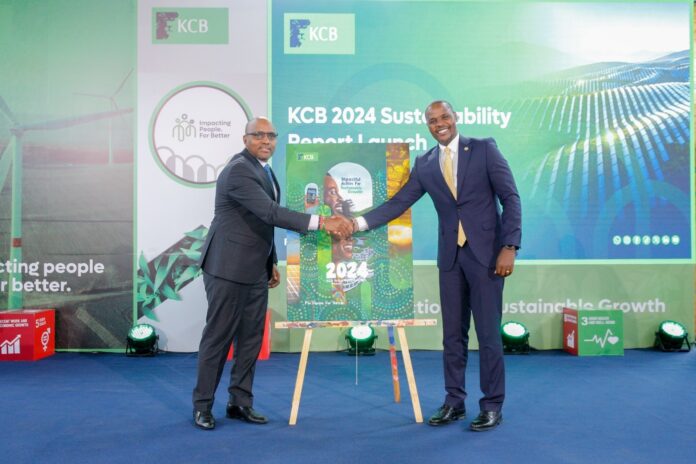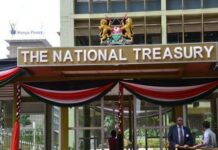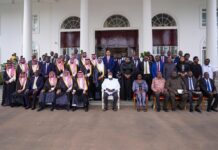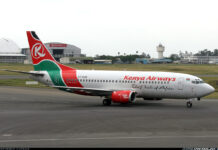KCB Group assessed loans valued at KShs. 578.3 billion for environmental and social risks last year, further enabling the Bank’s play in green financing.
This brings the cumulative total assessed since 2020 to over KShs. 2.5 trillion under the Group’s Environmental and Social Due Diligence (ESDD) process.
The lender disbursed KShs. 53.2 billion in green loans, growing its green portfolio to 21.32% from 15% in 2023. The support was extended to green products designed to foster energy transition, including initiatives in the blue economy, e-mobility, and climate change
adaptation. Of the KShs. 53.2 billion, nearly half, KShs.24.1 billion has been verified using the Climate Assessment for Financial Institutions (CAFI) reporting tool, further enhancing transparency and credibility.
At the same time, the Group allocated 7.5% of its supplier contracts, totalling KShs. 913 million, to businesses owned by special interests’ groups.
The details are contained in the 2024 KCB Group Sustainability Report launched on Tuesday, highlighting the Bank’s significant strides in climate action, financial inclusion, and community development and in line with its ambition to create long-term value for stakeholders while supporting Kenya’s transition to a green and inclusive economy
KCB Group CEO, Paul Russo said: “We committed to further aligning its interests with partner institutions to bolster economic development for the greater good for all. The conversation today must be aligned to how we safeguard the Planet and People even as we
pursue Profits”.
“The private sector has the opportunity, the manpower and the assets to enable our communities to thrive. While we are committed to making a positive impact, we have learned that sustainable practices should also be economically viable in the long run,” he added.
Last year, KCB Bank Kenya secured a KShs. 69 million Project Preparatory Facility from the Green Climate Fund. This is a critical step in our broader pursuit of KShs. 15.5 billion in funding to advance our sustainability agenda and positively impacting the lives of over 100,000 micro, small and medium enterprises.
KCB Group is actively reducing its carbon footprint and improving operational efficiency, as evidenced by a 4% reduction in overall resource consumption. Through targeted conservation measures, the Group has offset a carbon equivalent of 1.3 metric tonnes of carbon equivalent. This success was largely driven by the planting and growing of 1,386,203 trees.
Dr. Eng. Festus Ng’eno, Principal Secretary, State Department for Environment and Climate Change said, “For decades now, the financial sector has been hailed as an enabler of human progress. In today’s context, it has become much more than capital flow, it is a lifeline for
sustainable livelihoods. When thoughtfully directed, finance can help farmers adopt climate smart agriculture, empower small and medium enterprises to scale, enable women and youth to unlock their entrepreneurial potential, and catalyze innovation in renewable energy and green infrastructure. I am glad to see KCB Group continues to support green financing and has so far supported KShs. 160 billion worth of green projects.”
For the second year running, KCB Sustainability report underwent limited assurance by an independent auditor, Deloitte, the only such report for a Kenyan financial institution.
Furthermore, it has been prepared in reference to the IFRS S1 and S2 Standards, demonstrating the Group’s voluntary early adoption ahead of the mandatory deadline of 2027 set by the International Sustainability Standards Board (ISSB).
Beyond its own operations, the Group is addressing its indirect environmental impact by calculating its financed emissions for three key sectors: Motor Vehicle, Commercial Real Estate, and Business Loans. Based on these findings, the Group now conducts regular site visits to customers in carbon-intensive sectors to identify and support the implementation of emission reduction strategies.
“We need more and more businesses to adopt integrated thinking, where economic growth goes hand in hand with environmental integrity and social inclusion. When institutions publicly share their progress, their gaps, and their commitments, they raise the bar for the entire sector. This is the culture we want to nurture across all financial institutions in Kenya where transparency drives trust, and trust drives transformation,” said Mr. Raimond Molenje,
Chief Executive Officer, Kenya Bankers Association. KCB Group’s inclusive transformation agenda is rooted on shared value geared towards
tackling perennial societal challenges including youth unemployment, social inequity, and inadequate access to quality education. Through the KCB Foundation enterprise development programme, 2Jiajiri a total of KShs. 2.58 billion was disbursed as loans to 4,000 youth-owned MSMEs, 38% of which were women-led.
At the same time, 9,699 youths were equipped with critical business skills, supporting a total of 37,078 business, resulting in the creation of over 60,686 jobs and fostering a new generation of self-reliant business owners. The bank’s commitment also extends to increasing livestock productivity for Farmer Producing Organisations (FPOs) in Kenya’s ASAL counties through Mifugo ni Mali Programme which saw the uplifting of 1,119 poultry farmers and 913 blue economy entrepreneurs with market linkages and extension services.



















